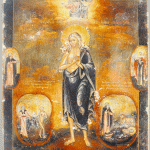
Often, out of vainglory and pride, various Christians like to present themselves as being better than others, suggesting, indeed, that they are holier than they actually are. They do this in a variety of ways. Some do this by showing the world what they have studied and learned, trying to make themselves look great through their apparent knowledge; often, not satisfied with merely looking smart, they also belittle others for not being like them, for not knowing what they have learned, thus putting people down as a way of propping themselves up even further. This form of smugness smacks of the worst forms Gnosticism, because implicit in the way they treat others is the notion that intelligence is a sign of holiness. Others make a pretense of piety, engaging various spiritual practices and devotions, saying their daily devotions make them superior to those who do not engage such practices. Some like to go out in the world, seeking people to condemn, acting like they are holy because they do not sin like those they judge. Not all Christians are like this. Some are not so smug; some simply live their lives the best they can, showing compassion to others, understanding we are all in this together. Such Christians have understood the faith more than those who put on a show of faith, for they live it out; their humility and love, done naturally and not out of show, allows them to grow in holiness and to be as God would have them be. Christians should not be engaging any form of external piety in order to receive accolades from those who watch; we are called to love everyone without any concern for such honors.
Jesus understood that many followed after him, believed in him, trusted in him, and even loved him, while still enchanted with and seeking worldly glory. The apostles were like everyone else in this regard. When vainglory and pride got the best of them, such as when James and John thought to ask Jesus to be so honored by him as to be able to sit right next to him when he established his earthly kingdom (as they thought he would), Jesus chided them, telling them that to be great they must become servants of all, for true greatness is found in such service and not in the power and authority people have to lord it over others:
“The cup that I drink you will drink; and with the baptism with which I am baptized, you will be baptized; but to sit at my right hand or at my left is not mine to grant, but it is for those for whom it has been prepared.” And when the ten heard it, they began to be indignant at James and John. And Jesus called them to him and said to them, “You know that those who are supposed to rule over the Gentiles lord it over them, and their great men exercise authority over them. But it shall not be so among you; but whoever would be great among you must be your servant, and whoever would be first among you must be slave of all. For the Son of man also came not to be served but to serve, and to give his life as a ransom for many” (Mk. 10:39b -45 RSV).
Jesus came to serve, and he served in such a way that he sacrificed himself for those whom he loved; as the high priest, he set up a new and everlasting covenant, one which is able to bring grace to everyone and lead them to their salvation:
But when Christ appeared as a high priest of the good things that have come, then through the greater and more perfect tent (not made with hands, that is, not of this creation) he entered once for all into the Holy Place, taking not the blood of goats and calves but his own blood, thus securing an eternal redemption. For if the sprinkling of defiled persons with the blood of goats and bulls and with the ashes of a heifer sanctifies for the purification of the flesh, how much more shall the blood of Christ, who through the eternal Spirit offered himself without blemish to God, purify your conscience from dead works to serve the living God (Heb. 9:11-14 RSV).
Christ served everyone with his love. If we are to follow after him and imitate him, we then should seek to serve others with love. We should not seek to lord it over others, nor to make ourselves look great among the people of the world. When we do that, we show we have yet to understand what Christ wants from us. Jesus told us that what he wants from is easy, indeed, it really is easy, for all he wants us for us to love, and yet we find loving as he would have us love is difficult because we let the things of the world get in the way of love.
Every time we try to find a way to make ourselves appear superior to others by demeaning them in some fashion, we show how far we are love. We are far from perfection. We might be closer than we were previously, and there might indeed be much good in what we say or do, but how we say it, how we do it, and the intention which lies behind our actions, is important and not to be ignored. It is easy to get caught up in the moment, follow after the passions, and speak out, trying to lord it over others, but we must find a way to speak what needs to be said, and do what needs to be done, with humility and love. It is such humility, such love, which is truly attractive, for it imitates the beauty of God. And those who see it, those who discern it in others, will see through it the direction they need to take in their lives if they want all that God has to offer.
This is why St. Mary of Egypt is important; she shows us the greatness of love and how it can elevate someone, making them truly great, even if and when they live their lives with a simple but profound humility which seeks not such glory for themselves. For her holiness, her virtue, came from the way she embraced love. Once she felt herself set free from her past, from all the sins and mistakes she made, so that she no longer felt cut off from God, she abandoned all earthly cares and concerns. She didn’t care what others thought of her, nor did she desire to have any power or authority over others. She abandoned everything to live simply in the desert by herself, while so many of those who would have judged her for her previous sins never found the holiness she came to possess because they never embraced the spirit of love which she came to know. All they knew was legalistic forms of piety, the kind which killed them in their spirit. It took meeting her in the desert, and hearing her story, for St Zosimas, a priest-monk, to understand this and stop looking for earthly glory for himself. Once he did, he found the holiness which he had sought for in his monastic discipline. Let us hope we can learn this lesson, so that we can truly become the people Christ intends us to be, to be people of love, people who put the needs of others before our petty desires. Let us make sure we do not become glory-seekers who use the Christian faith as a tool to bash others. Let us instead live as Christ taught us to live, to make sure we lift everyone up, sharing with all the love and grace which we have received from God so that they too can become partakers of the kingdom of God.
Stay in touch! Like A Little Bit of Nothing on Facebook.
If you liked what you read, please consider sharing it with your friends and family!













